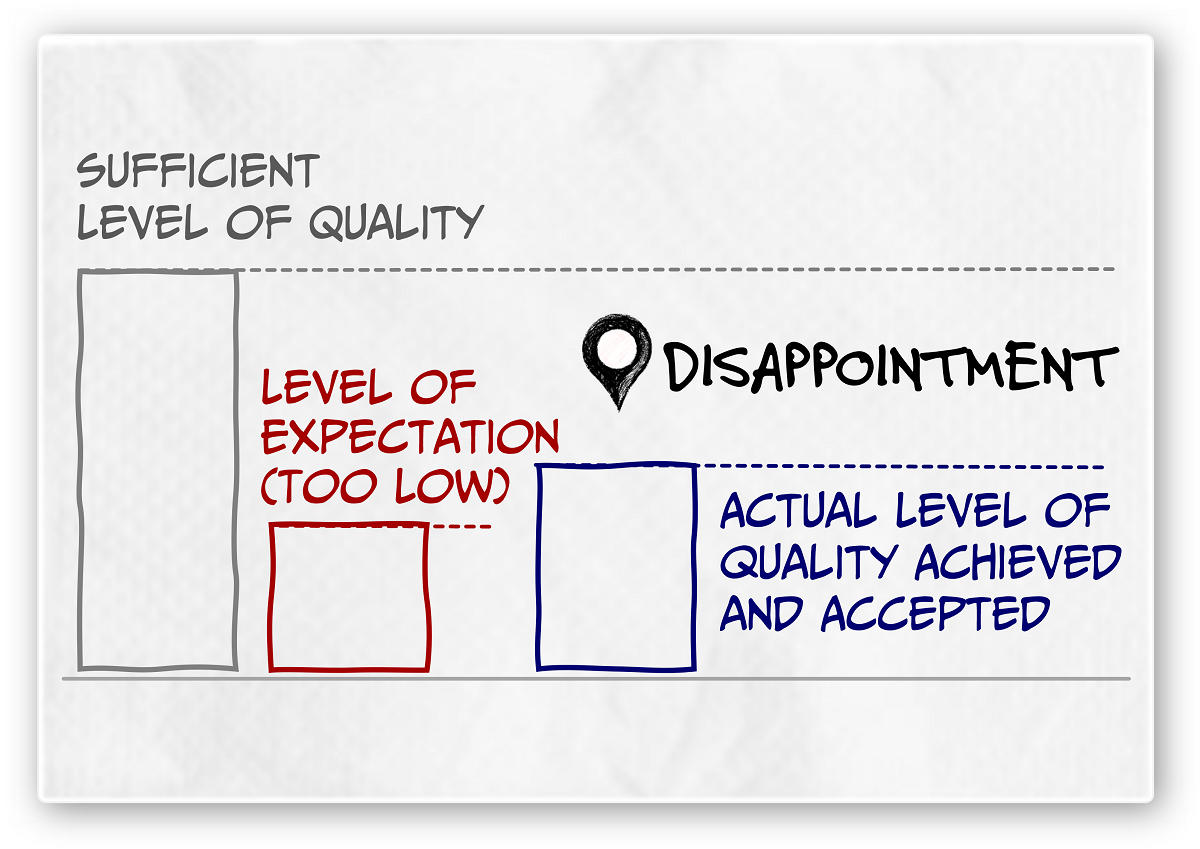What Is It About?
Napkin Version
Disappointment shows us the things that need adjusting or improving - be that something physical, the way we approach things, or in some cases, simply our expectations.
If we take the time to understand what needs our attention, learn from it, and make suitable adjustments, our quality of life can improve. If we miss the opportunity to learn from the situation, we can end up experiencing more disappointments than we need to.
Disappointment results from a mismatch between our expectations, the level of quality required for the situation, and the level of quality actually achieved.
Sometimes our bar is set too low, which means we are more likely to produce or accept poor quality, and end up disappointed.
Similarly if our bar is set too high, we may achieve the quality we need, but still feel disappointed due to our unrealistic expectations.
Minimising our disappointment requires striking the balance of achieving a suitable level of quality to produce the desired outcome, while keeping it doable for everyone involved (including ourselves).
Naturally, the more experienced and knowledgeable we are with a situation, the more we’ll be able to make a good judgement regarding the level of quality required. This makes it easier to manage the efforts required to achieve the desired outcome.
If we are in an unfamiliar situation however, we can be more prone to shortfalls unless we’re able to enlist the advice of those who are experienced, or can allow more room for variation.
-
The sooner we can accept the reality of the situation, the sooner our mind can stop wrestling with the gap between what we expected to happen, and what actually did happen.
-
Then thinking about what we would have done differently helps us to take any learnings from the situation, so we can move forward.
-
Identifying the good things to come out of it, shifts our focus to a more positive view, making it easier to work through what can be done about it, if anything.
Handling Disappointment
In The Moment
Training our brain to use a relevant process helps us to focus more effectively and move on more easily. Using it often will also help our brain to catch Disappointment sooner, making it easier to manage.
Self-Reflection
If the emotion feels quite troubling, it’s usually worth checking if something else is going on first.
By resolving things in ourselves and clearing any other residual emotions, we can reduce the intensity of the emotion - now and when we encounter it again in future.
Doing so also makes us less likely to ‘attract’ other difficulties that leave us feeling the same way.
See the Processing and Clearing an Emotion page for a generic process to resolve and clear an emotion.
Working Through Disappointment
The actions we choose to take in response to an emotion can make a significant difference to how well we adjust and move on from it.
The more we take genuine actions that are uplifting and ‘right’ i.e., are good for ourselves and everyone else (including the environment and other living beings) - for now, and over the long-term, the better our experience of life becomes.
Once we have accepted the reality of the situation, the following can help us to move on from our disappointment:
Considering the level of quality that would have been required to produce the desired outcome.
Looking at the context and anything out of the norm that may have affected things.
Considering if what was required was doable for everyone involved (including ourselves), taking into account experience and available resources.
Understanding the different dynamics of why it didn’t work out, to get to the root cause.
Determining what can be done to improve things now, or improve the outcome in the future.
Working with everyone involved to find ways to help things flow better in future.
Asking ourselves how we will approach things next time if a similar situation comes up again.
Deciding if we need to hold anyone accountable for their part, and if so, to what degree and in what way, would be best. Would cutting them (or ourselves) some slack in this instance be better?
Showing our appreciation to those who did their best to get a good outcome, even though it didn’t happen.
Considering if anything needs to happen in order for us to forgive and move on? And considering if that is likely to happen?
Taking the lesson, forgiving everyone involved (including ourselves), and getting on with our wiser future.
Appreciating the positives to come out of it.
Clearing Residual Disappointment
Emotional energy can stick with us, even after we have worked through and resolved whatever caused it.
There are a number of ways we can clear the energy, including doing something physical in nature, imagining the emotion leaving our body, or for more intense emotions, there is a variety of different therapies and alternative forms of energy healing that can also help.
-
The short video below has been created to help imagine emotional energy leave the body, using the following visualisation process:
Imagine holding a ball of energy in your hands, and ‘charging’ it with the feeling of love, and anything else that would help to offset it (especially any feelings that were missing in the situation)
Imagine any residual Anger energy flowing out of your body, into the ball, and being transformed into the positive equivalent.
Once all the residual energy has left, imagine the ball shooting far out into the atmosphere and dissolving into pure white light energy.








